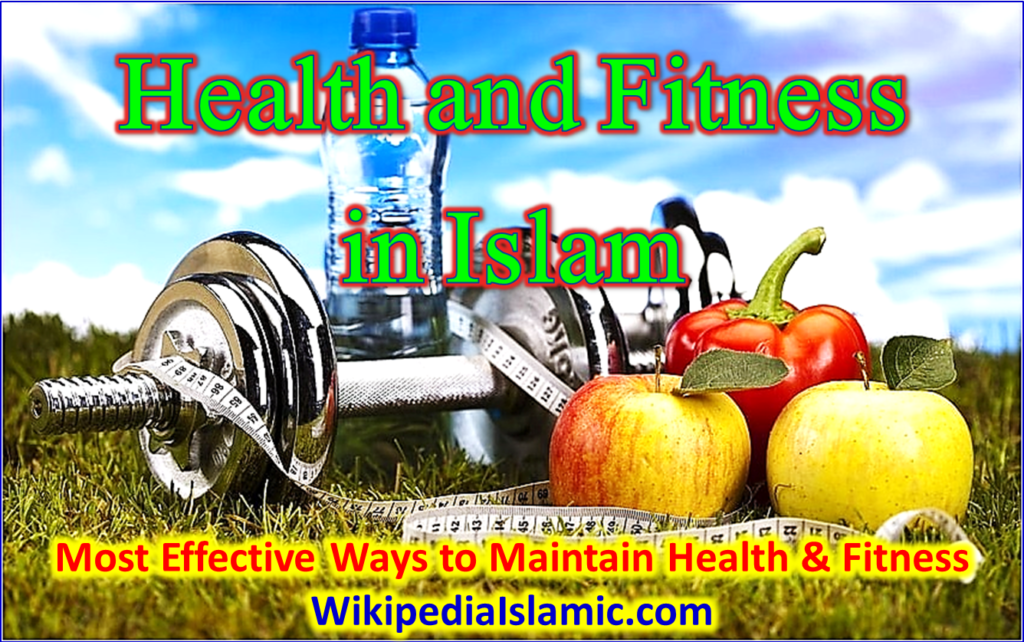Health and Fitness in Islam

Introduction
Health and fitness are essential components of a fulfilling life, and Islam recognizes their significance. Islamic teachings promote a holistic approach to well-being, focusing on the integration of physical, mental, and spiritual health. This article explores the principles and practices within Islam that emphasize the importance of maintaining a healthy lifestyle. By examining relevant examples and teachings, we can gain insights into the Islamic perspective on health and fitness.
Significance of Health and Fitness in Islam
Islamic teachings (Quran Majeed Hadith Sharif) clearly emphasize the importance of maintaining health and physical fitness. Islam encourages its followers to be habitual of various useful acts of physical exercises and games. Here are some verses of the Holy Quran and Holy Hadith, which shows the importance of physical health and fitness:
1. Importance of Physical Strength
Islam encourages physical fitness and strength as it enables individuals to fulfill their obligations and serve others effectively.
Allah Almighty says in the Holy Quran about Hazrat Musa Alaihissalam:
اِنَّ خَيْرَ مَنِ اسْـتَاْجَرْتَ الْقَوِيُّ الْاَمِيْنُ
Translation: “Verily, the best of men for you to hire is (physically) strong, the trustworthy.” (Al-Qasas:26)
The Holy Prophet Hazrat Muhammad (Peace Be Upon Him) said:
اَلْمُؤْمِنُ الْقَوِيُّ خَيْرٌ وَأَحَبُّ إِلَى اللہِ مِنَ الْمُؤْمِنِ الضَّعِيفِ وَفِي كُلٍّ خَيْرٌ
Translation: “The strong believer is better and more beloved to Allah than the weak believer, although there is goodness in both” (Sahih Muslim).
This hadith highlights the virtue of physical strength and its positive impact on an individual’s faith and character.
2. Health and Fitness is a Right of the Body / Physique
In Islam, the body is considered a trust from Allah. Muslims are obligated to care for this trust by maintaining good health. The Holy Prophet Hazrat Muhammad (Peace Be Upon Him) said:
فَإِنَّ لِجَسَدِكَ عَلَيْكَ حَقًّا
Translation: “Your body has rights over you.” (Sahih Bukhari)
This emphasizes the responsibility of Muslims to nurture and protect their bodies through healthy practices. Muslims believe that their bodies are a gift from Allah, and they have a responsibility to maintain them in good health. This includes avoiding harmful substances such as alcohol and drugs, getting regular exercise, and adopting a balanced diet.
3. Physical Power and Strength are Blessings of Allah Almighty
Allah Almighty has said in the Holy Quran about Hazrat Ta’aloot Alaihissalam:
قَالَ اِنَّ اللّٰهَ اصْطَفٰىهُ عَلَيْكُمْ وَزَادَهٗ بَسْطَةً فِي الْعِلْمِ وَالْجِسْمِ
Translation: “He said: verily Allah has chosen him over you and has increased him amply in knowledge and physique.” (Al-Baqarah:247)
Islamic Teachings and Emphasis on “Health and Fitness”
1. Eat the Things which are Good and Beneficial for Health (Dietary Guidelines)
Islam promotes mindful eating and encourages a balanced and nutritious diet. Muslims are advised to consume wholesome foods and avoid excesses. The Qur’an emphasizes the importance of moderation, saying:
يٰٓاَيُّهَا النَّاسُ كُلُوْا مِمَّا فِي الْاَرْضِ حَلٰلًا طَيِّبًا
Translation: “Eat of the good things We have provided for you” (Al-Baqarah:168). Muslims are encouraged to consume a variety of foods, including fruits, vegetables, lean proteins, and whole grains while avoiding excessive intake of unhealthy foods and beverages.
2. Avoid Excessive Intake of Food and Drink (Dietary Guidelines)
Allah Almighty Says in the Holy Quran:
وَّكُلُوْا وَاشْرَبُوْا وَلَا تُسْرِفُوْا ۚ اِنَّهٗ لَا يُحِبُّ الْمُسْرِفِيْنَ
Translation: “And eat and drink, but be not excessive. Indeed, He likes not those who commit excess. (Al-Aaraf:31)
This verse encourages moderation in eating and drinking, promoting balanced and healthy habits.
3. Moderation and Balance in Eating and Drinking (Dietary Guidelines)
Islam advocates for moderation in food and drink consumption. The Holy Prophet Hazrat Muhammad (Peace Be Upon Him) said:
مَا مَلأَ آدَمِيٌّ وِعَاءً شَرًّا مِنْ بَطْنٍ حَسْبُ الآدَمِيِّ لُقَيْمَاتٌ يُقِمْنَ صُلْبَهُ فَإِنْ غَلَبَتِ الآدَمِيَّ نَفْسُهُ فَثُلُثٌ لِلطَّعَامِ وَثُلُثٌ لِلشَّرَابِ وَثُلُثٌ لِلنَّفَسِ
Translation: “A human being fills no worse vessel than his stomach. It is sufficient for a human being to eat a few mouthfuls to keep his spine straight. But if he must (fill it), then one-third of food, one-third for drink, and one-third for air” (Sunan Ibn-e-Majah).
This teaching promotes balanced eating habits to maintain good health. Muslims are advised to avoid extremes and adopt a balanced approach. Overindulgence in food, excessive exercise, or neglecting one’s health are discouraged as they disrupt the equilibrium that Islam seeks to establish.
4. Avoid Substances which are Harmful for Health and Fitness
يٰٓاَيُّھَاالَّذِيْنَ اٰمَنُوْٓا اِنَّمَا الْخَمْرُ وَالْمَيْسِرُ وَالْاَنْصَابُ وَالْاَزْلَامُ رِجْسٌ مِّنْ عَمَلِ الشَّيْطٰنِ فَاجْتَنِبُوْهُ لَعَلَّكُمْ تُفْلِحُوْنَ
Translation: “O Believers! Wine and gambling and idols mounted (for worship) and divining arrows (for seeking luck, all) are filthy works of Satan. So turn away from them (completely) so that you may succeed.” (Al-Ma’aidah:90)
5. Encouraging Physical Activities and Useful Sports
Islam encourages physical exercise and regards it as a means of maintaining good health. The Holy Prophet Hazrat Muhammad (Peace Be Upon Him) engaged in physical activities and encouraged his followers to do the same. Examples from His life include:
- Swimming
- Horse riding, and
- Archery
Engaging in regular physical exercise, such as walking, running, or participating in sports, not only promotes physical fitness but also strengthens mental well-being. The Holy Prophet Hazrat Muhammad (Peace Be Upon Him) says:
وَأَعِدُّوا لَهُمْ مَا اسْتَطَعْتُمْ مِنْ قُوَّةٍ اَلآ ء إنَّ القوَّةَ الرَّميُ اَلَآء إنَّ القوَّةَ الرَّميُ اَلَآء إنَّ القوَّةَ الرَّميُ
Translation: “Prepare to meet them (the enemy) with as much strength as you can afford. Verily! Strength is in archery, strength is in archery, strength is in archery.” (Sahih Muslim)
Engaging in physical activities and exercise is encouraged in Islam. The Holy Prophet Hazrat Muhammad (Peace Be Upon Him) was known to participate in various physical activities, including swimming, horse riding, and archery. He (Peace Be Upon Him) said:
عَلِّمُوْا اَوْلَادَکُمْ الرِّمَایَۃَ وَالسِّبَاحَۃَ وَالرُّکُوْبَ الْخَیْل (اَوْ کَمَا قَالَ رَسُوْلُ اللہِ صَلیَّ اللہُ تَعَالٰی عَلَیْہِ وَآلِہٖ وَسَلَّم)
Translation: “Teach your children swimming, archery, and horse riding” (Sunan Ibne-e-Majah).
Note: According to some Muslim Scholars above narration, is the saying of Hazrat Umar Farooq (May Allah be pleased with him)
This demonstrates the importance of staying active and acquiring physical skills.
The Holy Prophet Hazrat Muhammad (Peace Be Upon Him) dwelled insistently on the games that have a purpose since they are related to the military for men and uttered many hadiths to encourage them. The issues that he dwelled on the most were archery, horse riding, walking and swimming.
6. Encouraging Hand Earned Livelihood or Physical Labour
The Holy Prophet Hazrat Muhammad (Peace Be Upon Him) said:
مَا أَكَلَ أَحَدٌ طَعَامًا قَطُّ خَيْرًا مِنْ أَنْ يَأْكُلَ مِنْ عَمَلِ يَدِهِ، وَإِنَّ نَبِيَّ اللہِ دَاوُدَ عَلَيْهِ السَّلاَمُ ـ كَانَ يَأْكُلُ مِنْ عَمَلِ يَدِهٖ
Translation: “No one has ever eaten a better meal than what his hands have earned. Indeed, the Prophet of Allah, (Hazrat) Dawood, used to eat from the earnings of his manual labour.” (Sahih Bukhari)
This hadith promotes the virtue of physical labour and self-reliance, indicating that engaging in productive work can contribute to physical health and well-being.
According to another Hadith Sharif:
اَلْکَاسِبُ حَبِیْبُ اللہِ
Translation: “The one who earns his livelihood with his own hands, is beloved to Allah Almighty.” (Musnad Imam Ahmed Ibn-e-Hanbal)
7. Consistency in Exercise
The Holy Prophet Hazrat Muhammad (Peace Be Upon Him) said:
اَحَبُّ الْاَعْمَالِ اِلَی اللہِ اَدْوَمُھَا وَ اِنْ قَلَّ
Translation: “The most beloved deeds to Allah are those done regularly, even if they are few.” (Agreed Upon)
This hadith encourages consistency in good deeds, including regular exercise and physical activities, as part of a healthy lifestyle.
8. Emphasis on Seeking Medical Care / Disease Cure
Islam places great value on preserving life and promoting well-being. Muslims are encouraged to seek medical treatment and take necessary precautions to maintain their health. The Holy Prophet Hazrat Muhammad (Peace Be Upon Him) said:
مَا اَنْزَلَ اللہُ دَاءً اِلَّا اَنْزَلَ لَهُ شِفَاءً
Translation: “There is no disease that Allah has created, except that He also has created its treatment” (Sahih Bukhari).
This hadith encourages Muslims to seek medical remedies and take care of their health.
9. Emphasis on Cleanliness and Hygiene
Islam emphasizes the importance of cleanliness and hygiene as part of maintaining good health. Muslims are encouraged to observe ablution (wudu) before prayer, which involves washing specific body parts. The Holy Prophet Hazrat Muhammad (Peace Be Upon Him) said:
الَطُّھُوْرُ شَطْرُالْاِیْمَان
Translation: “Cleanliness is half of faith” (Sahih Muslim).
This emphasis on cleanliness extends to personal hygiene, keeping the environment clean, and preventing the spread of diseases.
10. Worship and its Health Benefits
Islam recognizes the interconnection between spiritual and physical well-being. Worship acts along with spiritual benefits, carries benefits related to health as well. For example, Fasting, Prayer, Wuzu (Read full and comprehensive article on scientific, health, physical and psychological benefits of Wuzu) etc, have numerous health benefits. Engaging in physical exercises, such as performing the five daily prayers (Salah), involves physical movements, promoting physical fitness and flexibility while fulfilling spiritual obligations. Fasting during the holy month of Ramadan is a significant practice in Islam. While primarily a spiritual obligation, fasting offers numerous health benefits. It allows the body to detoxify, promotes weight management, improves insulin sensitivity, metabolic health and enhances self-discipline. Muslims also engage in voluntary fasts throughout the year, such as on Mondays and Thursdays, as recommended by The Holy Prophet Hazrat Muhammad (Peace Be Upon Him).
11. Mental and Emotional Well-being
Islam recognizes the importance of mental and emotional well-being which is part and parcel of good health. Muslims are encouraged to seek a balanced and harmonious state of mind through acts of worship, reflection, and seeking knowledge. Engaging in activities that promote mental health, such as spending time in nature, connecting with loved ones, and pursuing hobbies, is also encouraged.
Miscellaneous Practical examples of health and fitness in Islam
The following practical examples illustrate how health and fitness are integrated into the daily lives of Muslims, aligning with Islamic teachings and principles. By incorporating these practices, individuals strive to maintain a balanced and healthy lifestyle that nurtures their physical, mental, and spiritual well-being. Some of these practical examples are:
- Observing Fasting
- Incorporating Physical Movement in Worship
- Taking Breaks and Rest
- Promoting a Healthy Lifestyle
- Maintaining a Sleep Routine
- Mindful Eating
- Promoting Environmental Stewardship
- Engaging in Recreational Activities
- Stress Management and Self-Care
- Promoting Family Health
- Seeking Knowledge
- Using Technology for Health
- Striving for Balance
These practical examples showcase how health and fitness are integrated into various aspects of a Muslim’s life. By implementing these practices, individuals aim to fulfil their religious duties while promoting physical, mental, and spiritual well-being.
Conclusion
Health and fitness are integral aspects of Islamic teachings, emphasizing a holistic approach to well-being. By following the principles of moderation, balance, and self-care, Muslims can strive for physical, mental, and spiritual health. Engaging in regular physical exercise, adopting a balanced diet, and practising self-discipline through fasting are examples of how Muslims incorporate health and fitness into their lives. By nurturing their bodies as a trust from Allah, Muslims can lead healthy and fulfilling lives, aligning their actions with the teachings of Islam.
FAQs
1. Q: Is physical fitness encouraged in Islam?
A: Yes, physical fitness is encouraged in Islam. The Holy Prophet Hazrat Muhammad (Peace Be Upon Him) emphasized the importance of being physically active and strong. Engaging in physical activities, exercise, and sports is seen as a means of maintaining good health and fulfilling one’s responsibilities.
2. Q: Is it important to eat a balanced diet in Islam?
A: Yes, maintaining a balanced diet is emphasized in Islam. Muslims are encouraged to consume wholesome foods and practice moderation in eating. The Quran and Hadiths promote the concept of eating in moderation and avoiding excessiveness in food and drink.
3. Q: Are there any specific dietary guidelines in Islam?
A: Islam has specific dietary guidelines, such as avoiding the consumption of pork and alcohol. Muslims are also encouraged to consume halal (permissible) foods and abstain from haram (forbidden) substances. These guidelines are intended to promote physical and spiritual well-being.
4. Q: Are there any recommendations for maintaining mental well-being in Islam?
A: Yes, Islam promotes mental well-being. Muslims are encouraged to engage in acts of worship, seek knowledge, and practice mindfulness. Additionally, seeking support from loved ones, seeking professional help when needed, and engaging in activities that bring joy and relaxation are all part of maintaining mental well-being in Islam.
5. Q: Are rest and relaxation emphasized in Islam?
A: Yes, rest and relaxation are valued in Islam. Taking breaks, getting sufficient sleep, and engaging in leisure activities are encouraged to maintain physical and mental well-being. The Holy Prophet Hazrat Muhammad (Peace Be Upon Him) emphasized the importance of balancing work and rest, ensuring individuals have the energy to fulfill their obligations.






